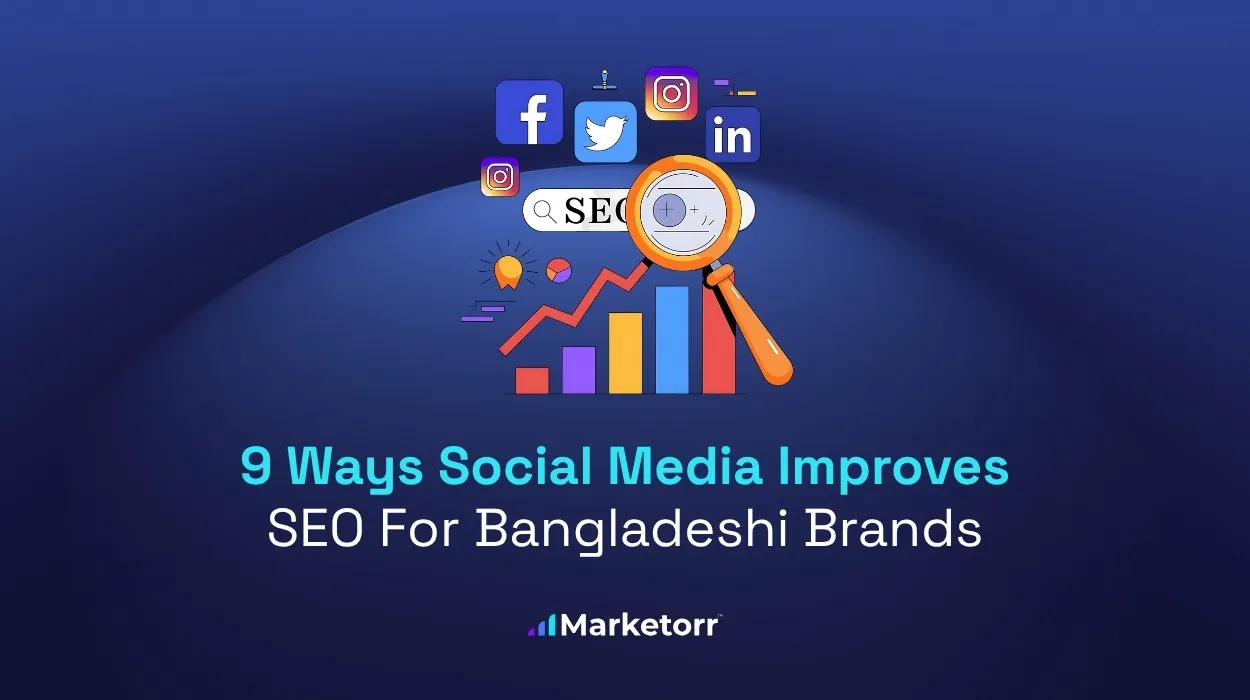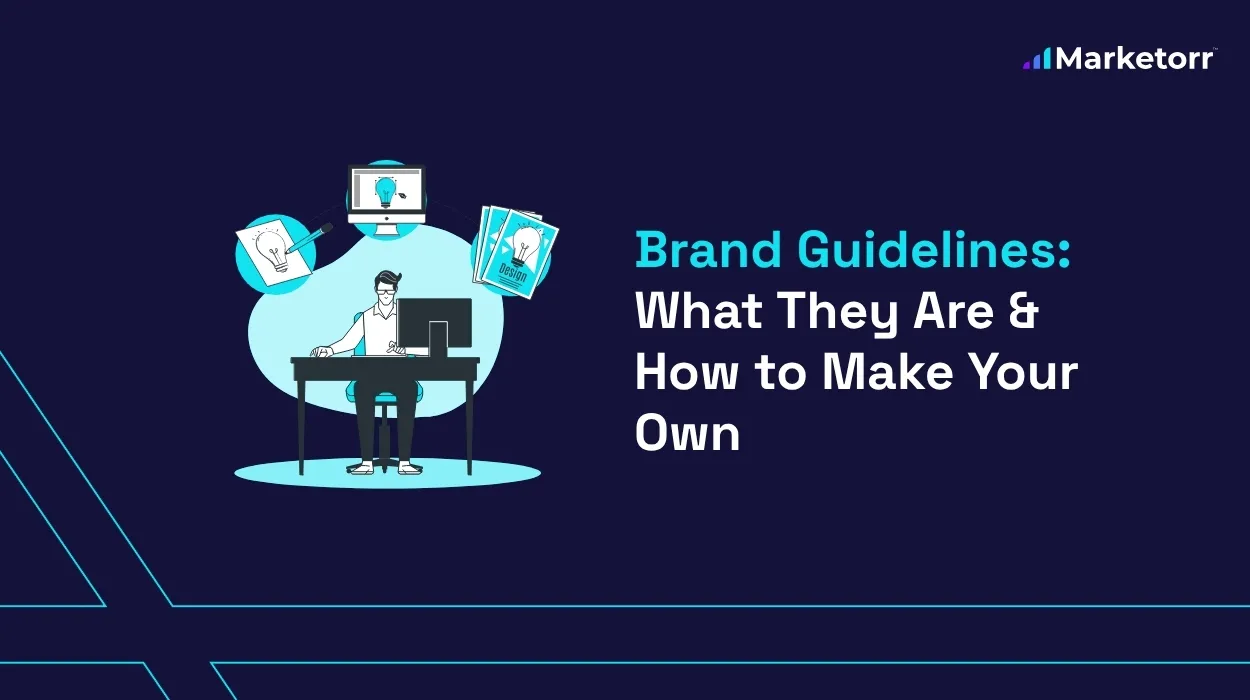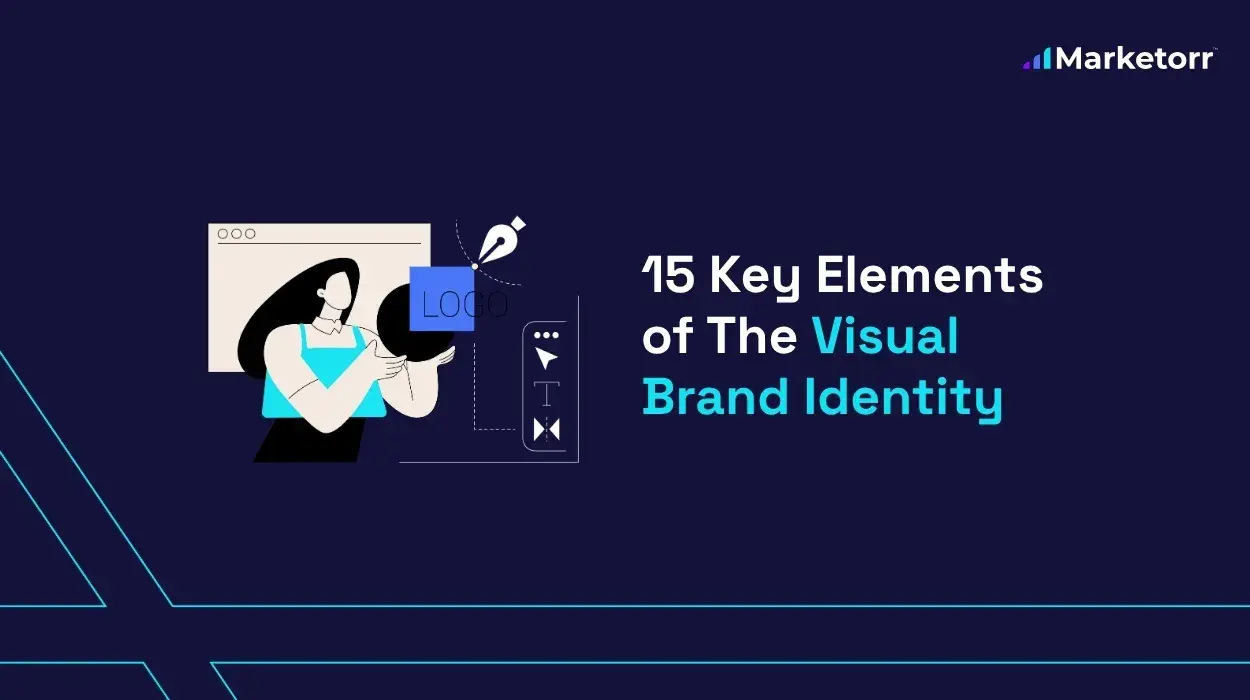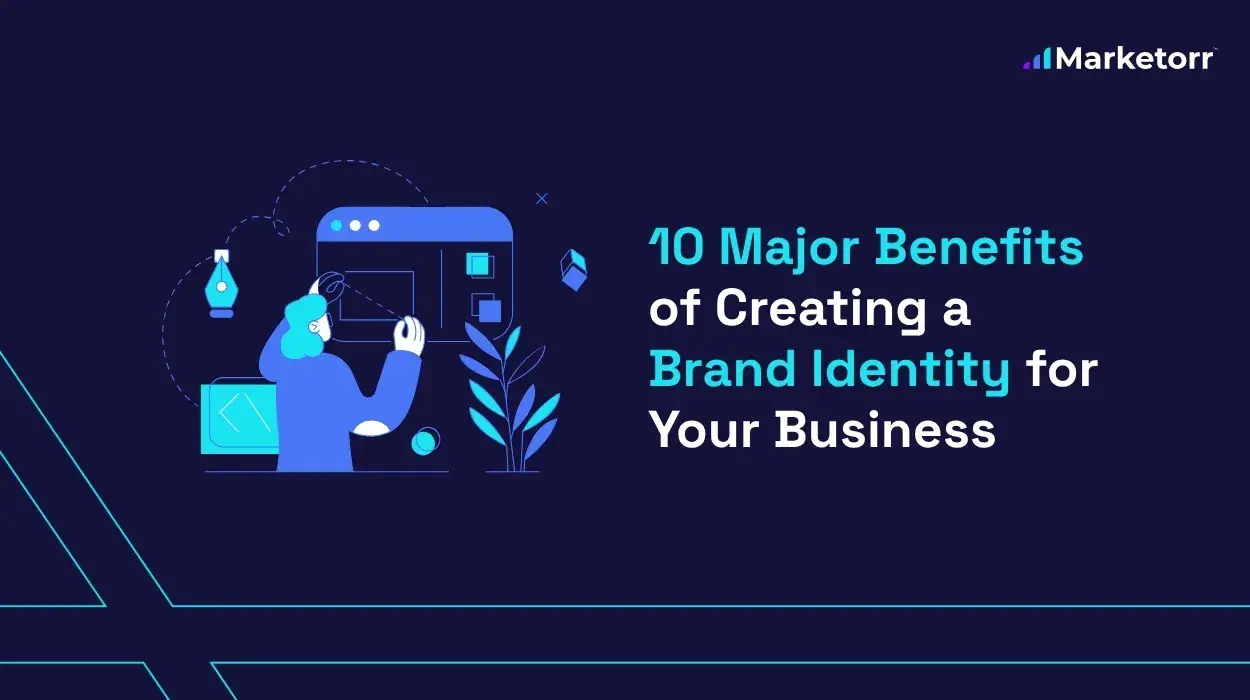Digital marketing accounts for nearly 70 percent of total ad spending globally, with over $667 billion allocated in 2024 alone. Despite this surge, many businesses face stalled growth due to fragmented strategies and underperforming campaigns.
A 2023 HubSpot report found that 61 percent of marketers struggle to generate traffic and leads consistently. As digital channels evolve rapidly, driven by AI, automation, and shifting algorithms, businesses increasingly rely on digital marketing consultants to deliver cohesive, results-focused strategies.
These professionals bridge gaps between marketing goals and execution, offering expertise that spans SEO, paid media, analytics, and automation.
Their growing relevance reflects a broader need for strategic alignment, measurable outcomes, and efficient scaling in an increasingly complex digital environment.
What Is a Digital Marketing Consultant?

A digital marketing consultant is a strategic expert who helps organizations plan, execute, and refine their online marketing efforts across various channels.
They operate independently of any tool or tactic and offer unbiased recommendations based on performance goals, audience insights, and market trends. Consultants assess the entire marketing landscape of a business, including its website performance, ad campaigns, content strategy, and analytics setup. Their role blends strategy with execution, often collaborating with internal teams or external vendors to ensure efforts are aligned and optimized.
This role has evolved significantly over the last decade. While early consultants often focused on SEO or social media, modern consultants must be fluent in analytics, automation, user experience, and full-funnel campaign strategy. They serve as both strategists and educators, helping teams understand how digital ecosystems work and how to make them perform better.
Core Responsibilities of a Digital Marketing Consultant
Consultants diagnose, plan, execute, and refine marketing strategies that drive measurable growth. Their tasks are varied but all focus on aligning digital activities with business goals.
Building Data-Driven Marketing Strategies
Strategy begins with clarity. Consultants understand the client’s goals, budget, audience, and competitive landscape. Then they use analytics platforms, customer behavior data, and industry benchmarks to shape a roadmap.
Data informs every choice, from platform selection to content formats. For instance, a 2023 survey by Gartner found that 72 percent of marketers who used predictive analytics improved campaign performance by at least 20 percent. This shows how strategic planning based on data often leads to faster, more scalable results.
Optimizing Campaigns for Traffic and Conversions
Rather than chasing vanity metrics, consultants focus on conversions and revenue impact. To refine campaigns, they analyze click-through rates, cost-per-click, customer journeys, and engagement signals.
Conversion rate optimization (CRO) is central to their work. A small improvement in CRO can significantly impact revenue. For example, increasing a landing page’s conversion rate from 3 percent to 4 percent could mean thousands in extra monthly revenue, depending on traffic volume.
Auditing Digital Presence and Identifying Gaps
Consultants often begin engagements with a full audit. This includes reviewing the website’s SEO health, usability, content performance, and ad efficiency. Tools like Google Search Console, SEMrush, and Hotjar help identify blind spots.
These audits frequently uncover technical SEO issues, misaligned messaging, or underused assets like email lists or blog archives. Fixing these issues can offer quick wins before implementing longer-term changes.
Aligning Tactics with Business Goals
Strategy must serve a purpose. A consultant ensures every tactic, whether it’s content, paid media, or email, is mapped to a business goal such as lead generation, retention, or revenue.
This alignment helps avoid marketing for the sake of marketing. When strategy is connected to outcomes, campaigns become more focused, budgets more efficient, and results easier to track.
Providing Ongoing Insights and Performance Analysis
Consultants don’t disappear after launch. They monitor performance and provide ongoing feedback. Tools like Google Analytics 4, Mixpanel, or HubSpot generate regular reports showing what’s working and needs adjustment.
Their analysis helps avoid missteps early and keeps campaigns agile. This approach also helps internal teams stay accountable and continuously improve.
Specialized Areas a Consultant Might Cover
A good consultant is a generalist at the strategic level, but may also bring deep expertise in certain channels or technologies. These are the most common areas of specialization.
SEO and Content Marketing
Search engines still drive most high-intent traffic. A consultant can audit your site’s technical SEO, identify keyword opportunities, and optimize content to align with search intent.
Google’s Search Quality Evaluator Guidelines emphasize expertise, authoritativeness, and trust (E-A-T) in content. Consultants ensure these principles are applied, which boosts visibility and credibility.
Paid Advertising and PPC Management
Consultants manage ad budgets across platforms like Google Ads, Meta, and LinkedIn. They test copy, bids, targeting, and placements to increase ROI.
Paid search and display ads remain critical for fast traffic generation. Yet without tight management, costs can spiral. A consultant minimizes waste while maximizing reach.
Social Media Strategy and Execution
Rather than posting randomly, consultants plan content calendars, engagement strategies, and audience targeting on platforms that matter to your niche.
To ensure social media contributes to real business results, they measure engagement rates, follower growth, and conversion metrics, not just likes.
Email Marketing and Automation
Email still delivers one of the highest returns on investment. Consultants optimize subject lines, timing, segmentation, and flows to increase open and click rates.
They also set up automation for nurturing, onboarding, and retention sequences, using tools like Mailchimp, ActiveCampaign, or Klaviyo.
Analytics, Reporting, and Marketing Technology Stack
Consultants set up or improve analytics systems. This may include configuring events, goals, and dashboards, or integrating tools like CRM, heatmaps, and attribution platforms.
Strong analytics enable smarter decisions. A 2023 Deloitte report found that companies with robust data practices were 23 percent more likely to exceed revenue targets.
7 Key Benefits of Hiring a Digital Marketing Consultant
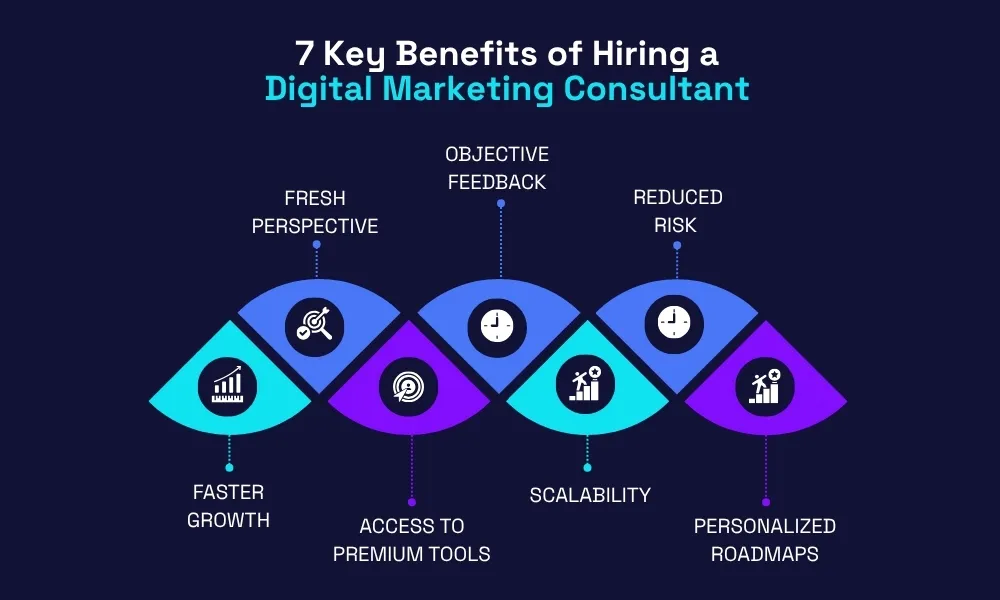
Bringing in a digital marketing consultant offers both immediate improvements and long-term advantages. Their outside perspective and hands-on experience help businesses unlock potential that often goes unnoticed.
1. Faster Growth With Expert Strategy
Consultants bring proven methods that have worked across industries. Instead of relying on trial and error, businesses gain access to already validated strategies. This shortens the time it takes to see results.
For example, many consultants use growth frameworks like AIDA or flywheel models tailored to the business type. These help create marketing plans that build momentum quickly, reducing wasted time and money.
2. Fresh Perspective on Stagnant Campaigns
Over time, internal teams may develop tunnel vision. A consultant can spot flaws or missed opportunities that internal teams overlook.
By reviewing campaigns with fresh eyes, they often recommend new angles, messaging adjustments, or unexplored platforms that reignite performance. This is especially useful when growth has plateaued.
3. Access to Premium Tools and Trends
High-quality marketing tools like SEMrush, Ahrefs, HubSpot, or Sprout Social often have hefty price tags. Consultants already have access to many of these tools and know how to use them effectively.
They also stay updated on algorithm changes, platform policies, and new techniques. This ensures strategies remain relevant and competitive in an ever-changing environment.
4. Objective Feedback and Honest Assessment
Consultants are not tied to internal politics or team dynamics. This makes their advice more objective and reliable. They can call out underperforming tactics or budget inefficiencies without hesitation.
This honesty allows businesses to make better decisions based on data and performance, not internal bias or tradition.
5. Scalability Without Long-Term Contracts
Hiring a consultant gives flexibility. Companies can bring them on for specific projects or phases of growth. There is no need to commit to a full-time hire.
This makes it easier to scale marketing efforts up or down based on budget, goals, or seasonality. Consultants also help build repeatable systems that internal teams can run later on.
6. Reduced Risk Through Experience-Backed Decisions
Mistakes in digital marketing can be costly. Consultants help avoid common pitfalls such as over-targeting, poor landing page UX, or incorrect data tracking.
They offer practical solutions that reduce risk because they have seen similar industry challenges. This saves money and builds confidence in decision-making.
7. Personalized Attention and Tailored Roadmaps
Rather than offering one-size-fits-all solutions, consultants build strategies that reflect the company’s unique goals, audience, and product.
They consider current capabilities, market conditions, and competition when building plans. This ensures that tactics are not only effective but also realistic and sustainable.
When Should You Hire a Digital Marketing Consultant
Timing matters when bringing in outside help. There are specific moments in a company’s growth when a consultant adds the most value.
A consultant is especially helpful during times of change. This could include launching a new product, entering a new market, or shifting business models. During these transitions, digital strategy must evolve quickly and smartly.
Another good time to hire is when internal teams are overwhelmed or lack certain skills. For example, if your content team is strong but lacks SEO knowledge, a consultant can close the gap without needing a full-time hire.
Consultants are also valuable after failed campaigns. If a major investment in ads or content has not delivered returns, an expert can diagnose what went wrong and build a recovery plan.
Early-stage startups can use consultants to set the foundation. Rather than building a marketing engine from scratch without direction, a consultant provides a blueprint that scales over time.
How to Choose the Right Digital Marketing Consultant

Finding the right consultant requires a mix of research and alignment. The goal is to find someone whose skills match your needs and whose approach fits your culture.
Start by defining your priorities. Are you trying to grow traffic, improve conversions, reduce cost per lead, or build brand awareness? Different consultants specialize in different outcomes.
Check for relevant experience. Ask about industries they have worked in and the results they have delivered. Good consultants will offer case studies or metrics to support their claims. Ask about their approach to strategy.
Do they offer audits? How do they measure success? What tools do they use? Clear answers to these questions signal professionalism and transparency.
Also consider fit. While expertise is essential, communication style and collaboration matter too. Choose someone who listens well, explains clearly, and shows genuine interest in your business.
Avoid consultants who overpromise. Marketing success takes time. Be aware of anyone who guarantees instant results or offers vague plans without data.
Here comes Marketorr with your digital marketing solutions. Marketorr provides every digital marketing service that must benefit your business. They will increase your popularity through a proper branding strategy and consultancy
How Much Does It Cost to Hire a Digital Marketing Consultant
Consulting fees vary widely based on expertise, scope, and location. Most consultants charge hourly, per project, or on a retainer.
Hourly rates typically range from 75 to 250, with top-tier consultants charging more. Project fees can start at 1500$ and go beyond 10000$ for complex campaigns.
Retainer models are common for long-term engagements. Depending on deliverables and involvement, these often range from 2000 to 10000 dollars per month.
While these costs may seem high, they often result in better investment returns. A consultant who helps improve your conversion rate or reduce ad spend waste can pay for themselves quickly.
Make sure to set clear goals and timelines before starting. This helps manage expectations and ensures that both sides stay accountable.
Timeline: How Long Before You See Results?
The time it takes to see results from hiring a digital marketing consultant depends on the goals, current performance, and type of strategies involved. While some improvements are visible in a few weeks, meaningful change usually takes a few months.
For example, changes to paid advertising like Google Ads or Meta campaigns can show performance shifts in as little as two to four weeks. This is because paid platforms allow real-time testing and fast adjustments.
On the other hand, SEO strategies such as content optimization, technical fixes, and link building often require three to six months to show impact. This delay comes from how search engines crawl and index content, as well as the time needed for improved rankings to drive new traffic.
Email marketing and automation typically show results within the first two months, especially if the consultant sets up better segmentation or conversion flows. Metrics like open rates, click rates, and sales from email campaigns often improve once the right structure is in place.
Analytics setup and performance tracking offer quicker feedback. A consultant can create dashboards or fix tracking issues within the first month, giving businesses a clearer picture of their performance.
These insights lead to better decisions that improve outcomes over time.
Even though results may take time, consistency and proper execution usually lead to steady growth. Businesses that give consultants enough time to implement and test strategies tend to see stronger long-term performance.
Measuring Success: How to Track ROI from Consulting
To measure the value of a consultant, clear benchmarks and tracking systems must be in place from the start. ROI is not just about revenue. It includes improvements in efficiency, clarity, scalability, and cost savings.
First, define your key performance indicators. For lead generation, this might include conversion rate, cost per lead, and lead quality. For e-commerce, metrics like return on ad spend, average order value, and cart abandonment rate are more relevant.
If the consultant works on SEO or content, track organic traffic, keyword rankings, bounce rate, and time on page. For email marketing, focus on open rates, click-through rates, and sales generated through automated sequences.
Use tools like Google Analytics, Google Looker Studio, HubSpot, or even custom spreadsheets to monitor results. Consultants often help set up these dashboards so you can see progress in real time.
One of the most overlooked forms of ROI is improved team alignment. A consultant often creates systems or documentation that helps internal teams work more effectively. This saves time, reduces confusion, and supports faster execution in future campaigns.
Also consider qualitative results. Better messaging, more confident decision-making, and clearer strategy contribute to business health, even if not directly tied to revenue.
Review performance at 30, 60, and 90 days to ensure accurate ROI tracking. Ask what is working, what has changed, and what comes next. Consultants should explain results clearly and offer data to support their impact.
Final Takeaways
Digital marketing consultants are valuable allies for businesses looking to grow smarter, faster, and with less risk. They bring fresh ideas, deep experience, and the ability to cut through digital noise to find what works.
A consultant can provide structure and clarity if your marketing efforts feel scattered, stagnant, or inefficient. They are especially useful during transitions, launches, or when internal resources are stretched.
Choosing the right consultant involves more than checking credentials. It means finding someone who understands your business, respects your goals, and communicates honestly and precisely.

